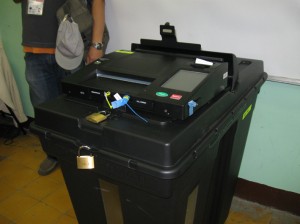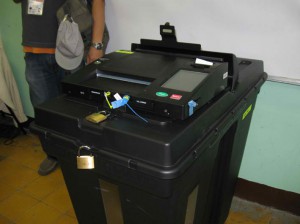By E.V. CARREON
 GUIMBA, Nueva Ecija.—At least 60 precinct count optical scan (PCOS) machines that went missing here after the May 10 elections are now at the Commission on Elections provincial office, with Smartmatic unable to explain how it lost control of these machines.
GUIMBA, Nueva Ecija.—At least 60 precinct count optical scan (PCOS) machines that went missing here after the May 10 elections are now at the Commission on Elections provincial office, with Smartmatic unable to explain how it lost control of these machines.
The Comelec ordered the PCOS machines brought to its provincial office in Cabanatuan City on May 25 from the Guimba Municipal Hall where they were stacked for nearly two weeks. Guimba Vice Mayor Ler de Guzman said these were the missing counting machines that turned up on May 16 after they were surrendered by some members of Boards of Election Inspectors (BEI).
In what is considered a breach of security, BEIs took possession of the machines and brought them home after Smartmatic technicians abandoned their posts en masse on the evening of May 10. Provincial Election Supervisor Fernando Cot-om said the technicians left before the designated forwarders could arrive and secure them.
Officials also could not say if the walkout of the technicians had anything to do with the fact that up to 98 percent of PCOS machines were unable to transmit results for up to five days after the elections.
What happened in Guimba is one of the many unanswered questions that were raised about the automated election system. Last week, the House Committee on Suffrage and Electoral Reform was swamped with allegations of fraud by losers who said that the system wasn’t foolproof.
So far, the committee has failed to tackle the issue of missing or stray PCOS machines, such as those in Guimba and machines that were found in the home of a Smartmatic technician in Antipolo in the days after May 10.
In a statement to the committee, National Movement for Free Elections chairperson Jose Cuisia asked, “Why is it that three weeks after the elections and based on reports, the PCOS and the CF (compact flash) cards have not been retrieved in full by the Comelec,” when it was able to replace the 76,000 defective compact flash cards in just a few days?
VERA Files has pressed Smartmatic officials for an answer to the Guimba problem which they promised to provide but never did.
Smartmatic contracted three manpower recruitment agencies to hire and train technicians for the May 10 elections: Manila Resource Development Corp. (Manred), Placewell International Services and Ventureslink International. Ventureslink handled Regions 3, 6, 7, 8 and Caraga.
Under Smartmatic’s own Consolidation and Canvassing System (CCS) Operators Manual, the field guide for the use of the PCOS machines, the BEIs and the technicians were supposed to pack the PCOS machines and all peripherals in the box in which they were delivered, seal the box and wait till the courier arrived to retrieve the CCS box.
When the polls closed on May 10, Smartmatic technicians in Guimba left without a word. “After the elections, nawala yung mga technicians ng Smartmatic kaya na-iwan sa mga BEI (After the elections, the Smartmatic technicians were missing so the devices were left with the BEIs),” Cot-om said.
Cot-om could not give a clearer answer, but he confirmed that the local police have a blotter of the incident in which the PCOS machines were surrendered by BEIs to the Municipal Treasurer’s Office. The MTO, however, refused to accept them.
On May 14, ten PCOS machines were found in the house of a BEI chairman. The 50 others turned up at other homes that weekend.
Cot-om also confirmed that the local Comelec officers did not accept the PCOS machines. “We followed the guidelines in the Comelec resolution. In this case, it is in the level of our higher officials (in Comelec) that should communicate this to Smartmatic,” he said.
Renato V. Diaz, former presidential adviser for North Luzon, has called for a full Comelec audit in the province because of the massive failure of PCOS machines to transmit results since Election Day.
Diaz, a candidate for congressman in the first district, claimed that 160 of 183 PCOS machines in Nueva Ecija failed to transmit results with Guimba and Talavera accounting for over 134,000 votes that were not digitally transmitted due to defects in CF cards.
Comelec Spokesman James Jimenez had earlier described as “sweet success” the first nationwide automated elections in the country, saying critics were proven wrong.
“We proved their worst predictions wrong. If we had followed everything they said and would come up with the same solution, it would not have been as sweet and satisfying as this one,” he said.
A banker in Guimba scoffed at Jimenez’s claims, saying there was an alleged “failure in automation” in Nueva Ecija. He said the Comelec cannot claim success when it comes to Nueva Ecija because the system was breached, and it did not lift a finger to investigate.
“There was a failure of automation here in Guimba. The service, the system, the machines and the flashcards were provided by Smartmatic-TIM. When these PCOS machines failed to transmit, what service did we pay for?” he said.
As part of standard operating procedure, Smartmatic-TIM, the producers of the PCOS machines, replaced the devices’ CF cards with new ones from its warehouse in Cabuyao, Laguna.
It appeared that the malfunctioning machines either went missing or were “taken home” following the widespread glitch, raising concerns among local candidates that Smartmatic-TIM’s technicians, BEIs and Comelec officials had been “compromised.”
“It could be electronic fraud,” Diaz said of what happened during the delays and malfunctioning of counting machines in Nueva Ecija, one of the country’s vote-rich provinces with an electorate of 1.2 million.
Diaz has demanded a 100-percent audit of the election results by the Comelec to find out whether or not the failure in the PCOS machines was only in the transmittal and not the content of the data transmitted, which would be tantamount to fraud.
An information technology expert pointed out that the data stored in the counting machines, particularly election results, could have been tweaked or changed during the time that the devices were out of sight.
The IT expert, a vice president at one of the country’s computer universities, also stressed that CF cards can be programmed to contain pre-determined votes. “CF cards are programmable memory storage devices. Any trained IT personnel can program this so that the output is already predictable,” he said.
As a shadow of doubt hovers over the results, the expert suggests a manual audit, preferably of all the votes cast.
The elements at play to perpetrate cheating, the expert said, are speed and technical know-how. “Speed, because before an investigation can be made into what happened during the delays, suddenly the results are already out.”
“The technical side of it lies in those who operated the PCOS machines and handled the compact flash cards. The big question is: Were these people compromised?” he said.
Under the Smartmatic-TIM poll automation process it developed, votes cast on the ballot are fed and digitally stored in the PCOS machine; the first eight copies of the results are printed by the BEI, which then pushes a button to transmit the results to the Comelec.
However, the problem arose when up to 98 percent of PCOS machines in Guimba did not transmit the results, as though the buttons of nearly all PCOS machines were not pushed or had malfunctioned.
The supposed glitch was followed by reports of missing PCOS machines, some taken home for two to three days while Smartmatic-TIM came through with its solution of replacing the CF cards.
On Election Day, Supt. Ricardo Marquez, Nueva Ecija police director, reported defective PCOS machines in at least 12 towns in the province.
Marquez said he understood that Smartmatic had an IT technician assigned to each PCOS and that the problem could be solved in due time.
But the Comelec already advised the BEIs in these areas to go on with manual voting. The ballots would be kept until spare machines from other towns arrived.
The weakness in the Smartmatic-TIM process was exposed, Diaz said. Its weakness is in the transmission where the PCOS machine is supposed to communicate with the server. “If you don’t transmit, you already broke the process. No transmission of results, no canvassing at the Comelec,” explained Diaz.
Diaz said it was not only provincial candidates who had a stake in the integrity of the votes being transmitted and canvassed but even candidates vying for positions in the 12-slot senatorial race, the party-lists, as well as Sen. Mar Roxas and Makati City Mayor Jejomar Binay who are in a neck-and-neck battle for vice president.
“Kung ang botong isang milyon ng probinsya ng Nueva Ecija ay kayang dayain para ipanalo ang isang gobernador o kongresista, paanong di ba’t higit na kayang ipanalo ang isang talunang kandidato sa bise president, senador o party-list (If one million votes in Nueva Ecija can be manipulated to favor a governor or congressman, wouldn’t it be just as easy to hand the win to a losing candidate for vice president, senator or party-list)?” Diaz asked.
Even Diaz’s political rivals have reported “errors” during the electronic canvassing of votes.
In Quezon town, former first district representative Josefina Joson claimed that she only garnered three votes and lost over 1,200 votes in three clustered precincts. Her rival Diaz allegedly lost 155 votes in the same precincts.
Speaker Prospero Nograles has already asked the Comelec to withhold full payment to Smartmatic-TIM until the joint Congress oversight committee certifies that the firm has fulfilled all its obligations.
Smartmatic-TIM’s P7.2-billion contract with the government, including the guarantee of a clean election count under the poll automation system, seemed to have been breached in many areas, including Nueva Ecija, he said.
Nograles said the House contingent in the joint panel of lawmakers has been alerted to conduct random or full manual audits of ballots to determine if Smartmatic-TIM had delivered what was expected of the company during the May 10 elections.
“Smartmatic must make public who they subcontracted this automation and flash cards to,” he said.
Even the camp of presidential candidate Joseph Estrada had claimed that the CF cards contained pre-programmed data of certain candidates and that, one week before the elections, services of hackers were being peddled for millions of pesos.
For his part, Diaz challenged Smartmatic-TIM to prove that their system did not fail. He hurled the same challenge at Comelec to investigate whether or not its people were involved in what he called the country’s first-ever automated poll cheating.
(VERA Files is put out by veteran journalists taking a deeper look at current issues.)
